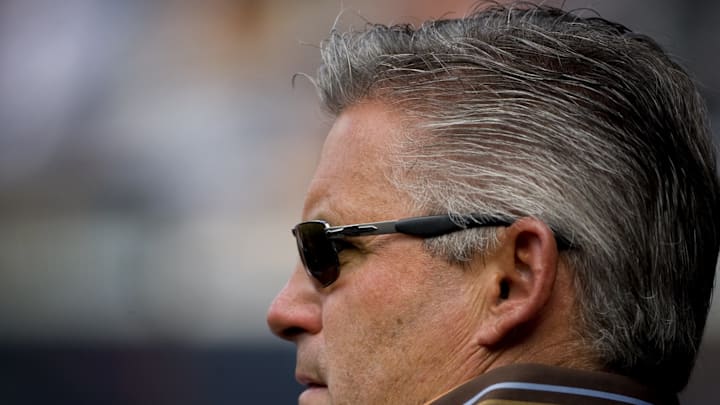
T-6. Kevin Towers, 2007, +6.7 (25-17-4)
The 2007 Padres were coming off a season in which they won the NL West via a tie-breaker over the Dodgers, so Towers had a good nucleus with which to work. That nucleus included pitchers Jake Peavy and Chris Young, shortstop Khalil Greene, closer Trevor Hoffman, outfielders Mike Cameron and Brian Giles, and first baseman Adrian Gonzalez.
But with the Dodgers an ever-present threat and the Arizona Diamondbacks improving, San Diego needed more. Towers went out and got help, although by season’s end his team was only good enough for 89 victories, tying Colorado for a wild card spot. The Rockies won that playoff game in walk-off fashion, ending San Diego’s postseason hopes.
Towers did his part. A five-player trade with the Mets in November of 2006 landed reliever Heath Bell, who played a critical supporting role for the aging Hoffman. Bell worked 94 innings with a 2.02 ERA. A midseason deal with Oakland landed troubled but talented outfielder Milton Bradley, and he hit .313 with 11 home runs in 42 games.
To back up Peavy and Young, Towers signed 41-year-old Greg Maddux in the hope that the multiple Cy Young Award winner had one more magical season in him. Maddux responded with 14 wins in 34 starts.
When Matt Holliday scored on Jamey Carroll’s 13th inning sacrifice fly to end that playoff game in a 9-8 Rockies win, all of Towers’ efforts turned out not to be enough to get San Diego into postseason play for what would have been a franchise record third straight season.
It was a bitter outcome since the Padres lost the season’s final two games, a win in either of which would have advanced them. Then they gave up a two-run lead in that fated 13th.
But the Padres came as close as it was possible to come to qualifying without actually doing so. Towers had a lot to do with putting them in position to get as far as they did.
